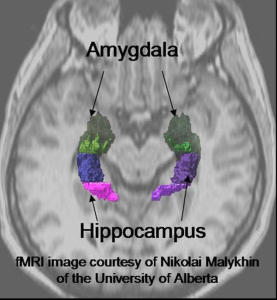
In traditional practices, acupuncture has been used to effectively treat anxiety problems, with or without depression. Now, modern research has shown that acupuncture can be as clinically significant as psychological counselling in the treatment of depression.
Recent studies have linked psychological depression with activation of the amygdalae, an important little pair of almond-shaped structures located behind the eyes and about as far back as the ears. Dr. Nikolai Malykhin and his team at the University of Alberta have documented increases in both the size and “activation” of the amygdala in people experiencing depression.
MRI or magnetic resonance imaging has permitted researchers to investigate various diseases and mental illnesses looking for changes in brain structure. And more recently, functional or fMRI allows researchers to observe relative blood flow in the brain where they look for increases (called “activation”) or decreases (called “deactivation”) in blood flow.
The amygdala is part of a broad collection of brain structures called the limbic system, which is primarily responsible for our emotional experience, and it is centrally involved in the formation of memories. The paired amygdalae are important in the processing of memory, decision-making, and emotional reactions in a survival type level, and are intimately and structurally connected to the hippocampus (see diagram). The hippocampus is primarily involved in the formation of memory, and from these structures survival type reactions are formed. These are involved with the classic “Pavlovian” training of a dog to salivate to a bell (because he usually gets fed when the bell rings), or a panic attack of a war veteran with agoraphobia and PTSD as he comes to an open space, decades after being traumatized in battle.
How scientists ask questions and design experiments to answer them influences both what they find and how they interpret the results. If you look for local effects of putting a needle in a muscle, you are able to find local effects (or not); the same goes for general effects on the whole body, or changes in brain activity. There are many mechanisms through which acupuncture likely has its effects, and the sophistication of the research, as is demonstrated by these fMRI studies, is growing. The western preoccupation in both practice and research has been almost exclusively on pain and muscle problems.
I believe future research will continue to expand and further our understanding of how acupuncture works to treat different conditions. Acupuncture represents complex interactions of both direct and indirect effects on the mind and body. In time, research may be able to explain the traditional uses of acupuncture beyond muscle pain, such as by promoting a general relaxation response and calming the “fight or flight reaction”. From this future knowledge, we will better be able to explain mechanistically why acupuncture can support critical health factors like improving sleep, mental well-being, immunity, and digestion, and have broad affects on things like cardiovascular function, fertility and states of being associated with health and thriving, not just absence of disease.


